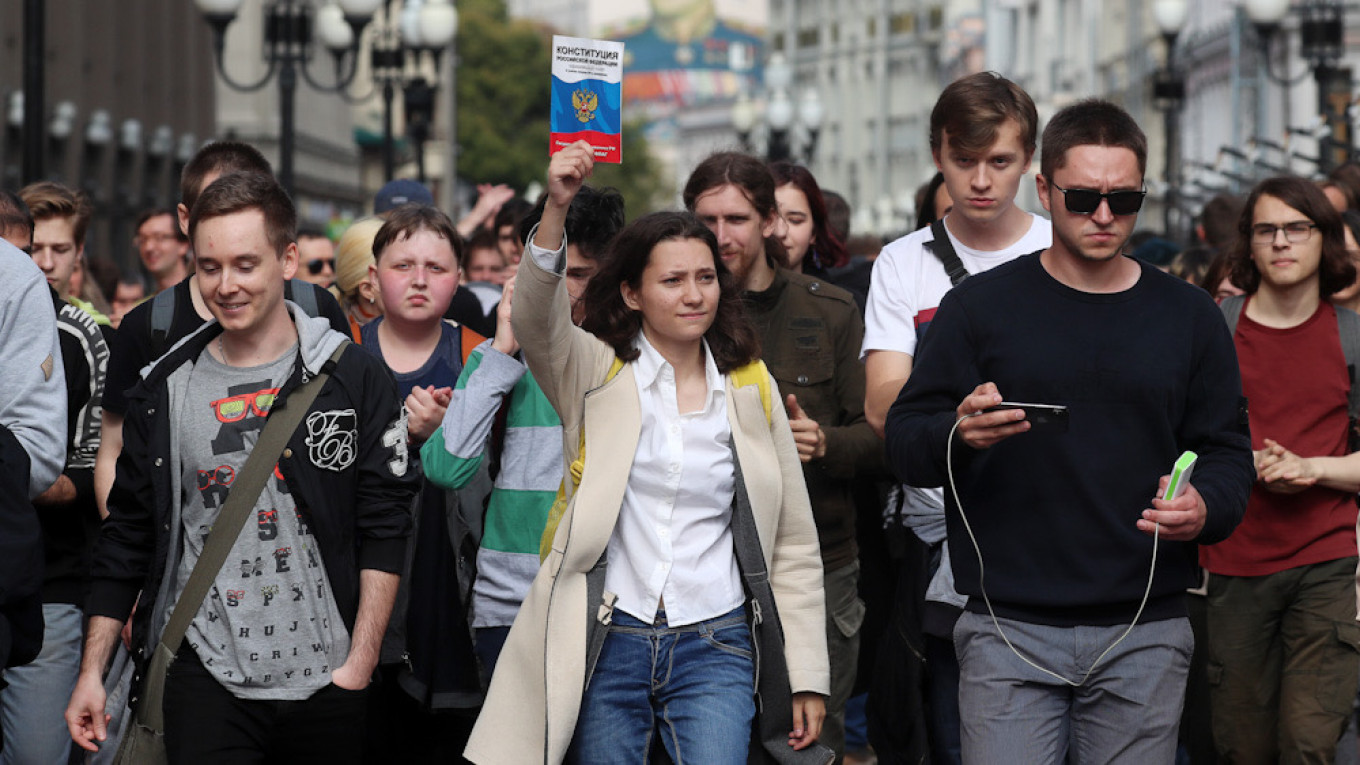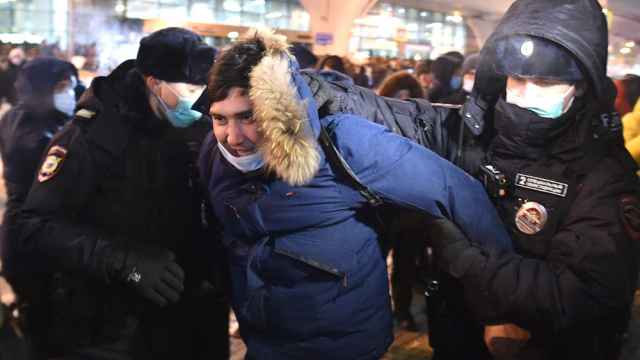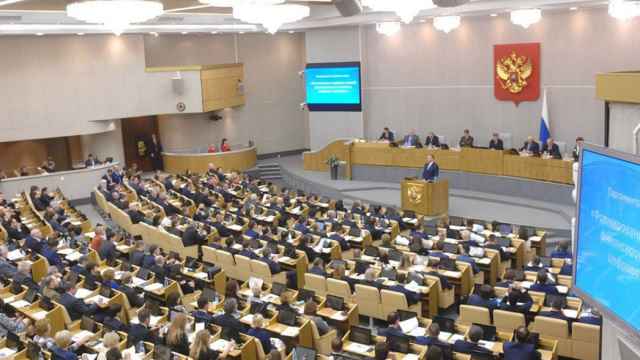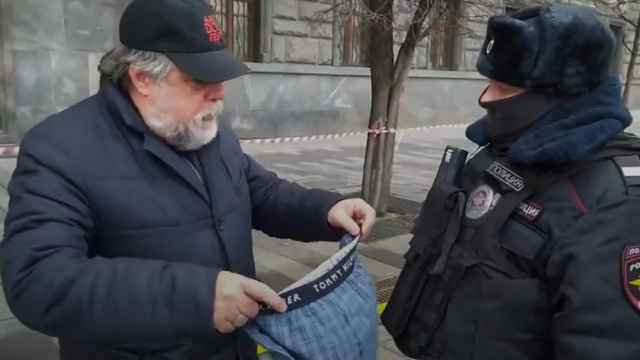When Olga Misik splashed red paint on the guard’s booth outside the federal prosecutor’s office in Moscow last summer, she didn’t think the minor political act would turn into a criminal offense.
“Two days before I acted I did my research and understood that this wouldn’t even be classified as an administrative offense,” Misik, who is now 19, told The Moscow Times in an interview.
In May, a Russian court sentenced Misik, her boyfriend Igor Basharimov, 28, and fellow activist Ivan Vorobyovsky, 24, to almost two years of official curfew and restrictions on vandalism charges.
Misik is now banned from using the Internet or sending mail by post, leaving her house between 10 p.m. and 6 a.m., approaching official buildings or attending public events. Vorobyovsky and Basharimov are under similar curfews.
The court also prohibited Misik from contacting fellow detainees, including her boyfriend, before they gave testimonies. A court appeal hearing is scheduled for Sept. 1.
Despite the nervous stutter punctuating her sentences, Misik is eager to speak her mind.
“It’s so easy to become numb when you read about repressions every day in the news,” she said.
Misik belongs to a generation born and raised under President Vladimir Putin, some of whom have grown up to rebel against him.
“It would seem that having been born under Putin and lived our whole lives under authoritarianism, we have to get used to it and come to terms, but no,” Misik said.
The internet-savvy generation grew up watching both Putin’s New Year’s addresses and jailed Kremlin critic Alexei Navalny’s YouTube investigations into state corruption.
“For the past two years, I have had this recurring dream of me turning on a TV during a New Year’s address and hearing a familiar voice saying ‘Hello! This is Navalny,” Misik said.
Even before her vandalism conviction, Misik had earned herself the nickname “Constitution Girl” after going viral for reading the Russian Constitution out loud to armed soldiers during Moscow protests calling for Navalny to be allowed to run in elections.
“I wanted to somehow get through to them, to explain that we were there for peaceful purposes. Now I understand that this is impossible and the time for talking is long gone,” she said.
“The poisoning of Navalny was the point of no return for me and those who have not joined the fight for freedom will never do so,” she added.
Misik is also a journalism student at the Moscow State University, but due to her sentence she has been unable to attend classes and has missed out on her coursework and building friendships with fellow students.
Her dream of interning at Novaya Gazeta, the investigative newspaper that launched the career of journalist Anna Politkovskaya who was murdered on Putin’s birthday in 2006, was also quashed. She received an acceptance letter for an internship on the day she was detained for vandalism.
While Misik originally planned throwing paint at the guard’s booth to be a last hurrah of political activism, the events that followed have spurred her on.
“I was simply left with no choice. I am going to continue my political, human rights and public activism with increased zeal for as long as it takes,” she said.
“The guard booth of federal importance”
The case dubbed by the media the “guard booth of federal importance” has set the framework for other cases used to silence opposition in Russia, according to Misik’s lawyer Dmitry Zahvatov.
“The point of this framework is quite straightforward –– to create a criminal case out of thin air in the absence of a real crime. Then to add weight to the case, Russian prosecutors add volumes of useless material which is presented as evidence,” Zahvatov told The Moscow Times.
The Russian authorities have intensified their crackdown on opposition since Navalny’s August 2020 poisoning and subsequent jailing.
In January and February, several of his closest allies were detained and charged with violating Covid-19 related sanitary-epidemiological restrictions during protests.
In April, a Russian court filed criminal charges against students running the website DOXA. They now face up to three years in prison for “inciting minors to protest'' after they posted a video about the Navalny protests. The court has sentenced DOXA student editors to pre-trial restraints similar to those imposed on Misik, Basharimov and Vorobyovsky.
After pre-trial sentencing, Russian prosecutors typically keep extending the terms of restrictions, saying they need more time to gather evidence because under preventive measures, detainees cannot participate in any events or speak out on political topics, Zahvatov explained.
He pointed at a photo of the damage Misik caused to the guard’s booth — a small splash of paint on its base.
“This is what they call a crime,” he said.
“We laugh because otherwise we would all go crazy.”
A Message from The Moscow Times:
Dear readers,
We are facing unprecedented challenges. Russia's Prosecutor General's Office has designated The Moscow Times as an "undesirable" organization, criminalizing our work and putting our staff at risk of prosecution. This follows our earlier unjust labeling as a "foreign agent."
These actions are direct attempts to silence independent journalism in Russia. The authorities claim our work "discredits the decisions of the Russian leadership." We see things differently: we strive to provide accurate, unbiased reporting on Russia.
We, the journalists of The Moscow Times, refuse to be silenced. But to continue our work, we need your help.
Your support, no matter how small, makes a world of difference. If you can, please support us monthly starting from just $2. It's quick to set up, and every contribution makes a significant impact.
By supporting The Moscow Times, you're defending open, independent journalism in the face of repression. Thank you for standing with us.
Remind me later.







